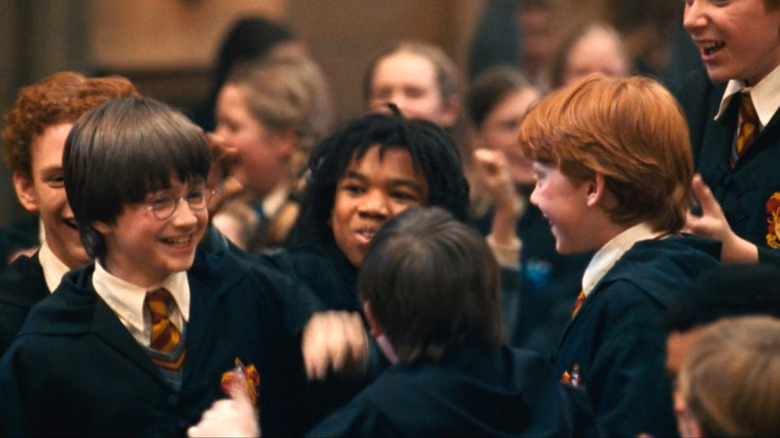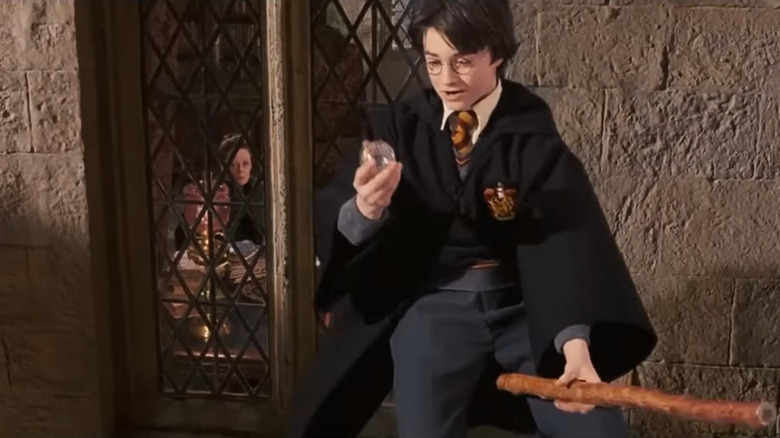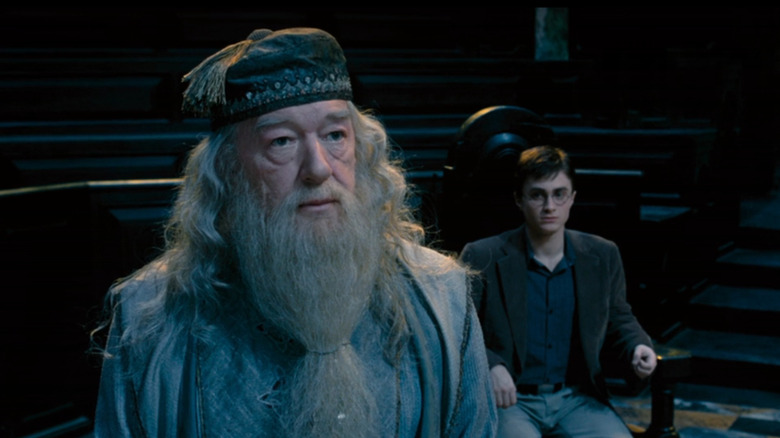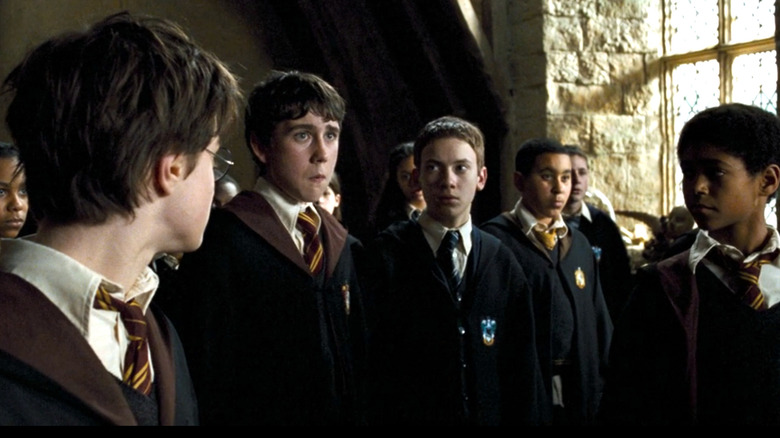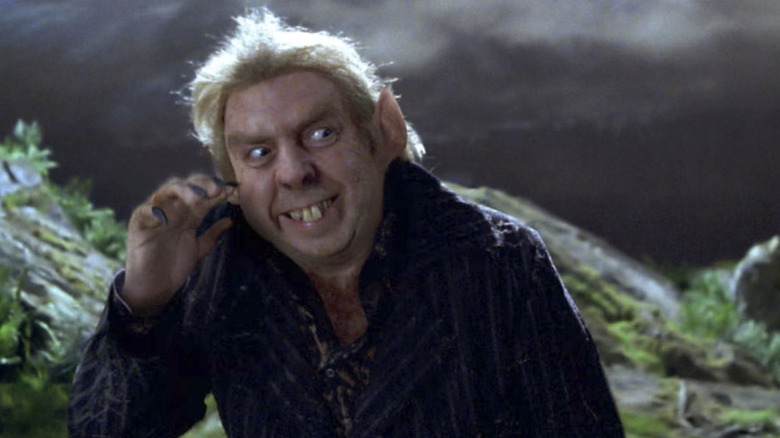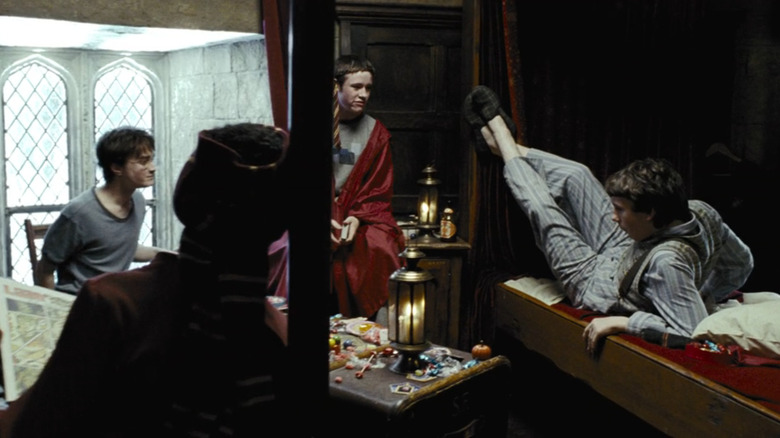Harry Potter's Gryffindor Traits Explained
Of the four Hogwarts houses, it's clear which one author JK Rowling wanted readers to like the most. While Slytherin is the blatantly evil house and both Ravenclaw and Hufflepuff are relegated to the sidelines, Gryffindor is front and center for all seven books. Gryffindor is the house the titular Harry Potter is sorted into, along with his two close friends Ron and Hermione.
At the end of the first book/movie, when Gryffindor enjoys a surprise victory in the school's annual good behavior competition (called the House Cup), the reader is expected to cheer along with the Gryffindors. Even though the means by which they win are ridiculous — the schools' Gryffindor headmaster gives them a bunch of points at the last second — the Gryffindors are the Good Guys, so the audience is expected to handwave the clear favoritism away. The Hufflepuff and Ravenclaw students are also shown cheering for Gryffindor's win, giving the reader tacit permission to ignore the unfairness of the situation.
If you're new to the "Harry Potter" series, you may be wondering what's so good about the Gryffindors anyway. Why do they get such special treatment in this story? Why didn't Rowling put Harry into some other house instead? Well, the main reason she chose Gryffindor is because of the house's primary trait, a trait that is exactly what the protagonist in a children's book series should always have ... bravery.
What are the key traits of a Gryffindor student?
As the wise old Sorting Hat put it in the first book, the Gryffindors' main quality is that they're "brave at heart." The hat notes that they're known for "their daring, nerve, and chivalry." A savvy young reader will notice that the Sorting Hat complements Gryffindor more than it does the other houses. For contrast, the best it can say about the Slytherins is that they're "cunning," which is quite a back-handed compliment.
The qualities of Gryffindor are best displayed by Harry himself, who spends all seven books doing things described even by the narration as "both very brave and very stupid." He's constantly risking expulsion by investigating a new mysterious conspiracy that's going on at Hogwarts, and he often fights back against Professor Snape's abuse, even though he knows it'll end poorly. Harry's characterized as someone who will always do the right thing regardless of the personal cost. (Well, except when it comes to those poor house elves.)
Harry's first quintessential Gryffindor moment comes in the finale of the first book, where he, Ron, and Hermione sneak out after class and put themselves through a series of deadly tasks to save the Sorcerer's Stone from falling into Lord Voldemort's hands. We'd later find out that Dumbledore had the situation under control; in fact, Voldemort never would've had any chance of finding the stone if Harry hadn't inserted himself into the situation in the first place. Despite all that, Dumbledore and the other professors admire Harry's bravery and reward his actions anyway.
Harry's bravery also leads to him landing the star Seeker role in his house's Quidditch team. Although Harry just picked up a broomstick five minutes ago and first-year students aren't even allowed to try out for the team yet, Professor McGonagall hands Harry the position immediately, spitting in the faces of every older Gryffindor student who'd been planning to try out that year. There's a blurry line between Harry being rewarded for his bravery and being rewarded for his luck, which is part of why he has such a large collection of haters throughout the series.
Who are the most prominent Gryffindor characters?
For the first three books, basically every major sympathetic character outside the trio is a Gryffindor. Ron's entire family is made up of Gryffindors, as is Hagrid, Lupin, McGonagall, and, of course, the wise headmaster Albus Dumbledore. Some of this comes down to a perspective bias — the series is mostly told from Harry's point of view — but some of it feels like a missed opportunity to flesh out the rest of the school.
With Hagrid, for instance, would it have killed Rowling to let him serve as the additional Hufflepuff representation the series so sorely lacked? The house fits him so well, and since he's an adult, it's not like Hagrid's house affiliation would've hindered his ability to interact with the main trio.
Outside of Harry, the two biggest Gryffindors in the series are Ron and Hermione, which is interesting considering their contrasting personalities. Hermione, with her love of studying, has often led fans (and characters within the books) to speculate that she should've been a Ravenclaw. Meanwhile, Ron, with his loyalty to Harry and his insecurities around being seen as talentless compared to his friends, feels like someone who should've been a Hufflepuff.
But neither Ron nor Hermione has been accused of being a GINO (Gryffindor In Name Only) as often as their poor, struggling classmate Neville Longbottom. Introduced as a trodden-upon boy looking for his pet frog, Neville is a punching bag for most of the first three "Potter" novels. He's seen as talentless, clumsy, forgetful, prone to anxiety, and performing poorly under pressure. Everything about Neville seems designed to make fans wonder: Did the Sorting Hat mess up with him?
Were some characters falsely sorted into Gryffindor?
But one of the delights of the "Harry Potter" series is watching Neville slowly but surely prove his bravery. The first sign of this is when he stands up to the trio at the end of the first book (which goes poorly for him), but the first real sign comes in "Goblet of Fire" when he asks Ginny Weasley to the Yule Ball. Neville's gutsiness with Ginny pays off, and she says yes; it serves as a stark contrast to Ron and Harry's weeks of indecisive fretting.
Ron and Hermione also get plenty of chances to prove their Gryffindor gumption throughout the books. Hermione's most Gryffindor moment is probably when she pushes Harry to start an underground fight club in "Order of the Phoenix," even though she's violating a million school rules in the process. Ron's biggest Gryffindor moment comes early in the series, when he sacrifices himself in a violent game of wizard chess so Harry and Hermione could continue looking for the Sorcerer's Stone without him.
The "Harry Potter" series often raises the idea that a person's house has more to do with what character traits they prioritize, rather than what character traits they actually have. Hermione may seem like a Ravenclaw, for instance, but in the end, she values bravery more than she values books.
The only real hole in the worldbuilding here is Peter Pettigrew, the Gryffindor-raised side-villain who's revealed to have betrayed Harry's parents to Voldemort. Pettigrew is a malicious coward, and he doesn't even seem to feel that bad about it, which raises the question of how he ended up in Gryffindor in the first place. Fans have often debated this issue, and the general consensus is that Pettigrew's a Gryffindor because he wanted to be brave like the rest of his Gryffindor friends but failed to measure up. The tragedy of Pettigrew is that he, at some point, must've had the potential to become a brave man, but by the time we meet him in "Prisoner of Azkaban," that potential's long been squandered.
Are the Gryffindors overrated?
The evil and cowardly nature of Pettigrew makes for a fun twist of expectations in "Prisoner of Azkaban," and it calls into question the general notion that Gryffindor is The Good Guy House. As much as the series' worst characters largely reside in Slytherin, it can't be forgotten that Gryffindor holds the most detestable character of them all. Severus was a double agent, Lord Voldemort had an aura, Bellatrix was a fun hang, and even Draco had a quasi-redemption arc at the end; Pettigrew is merely a worthless sad sack who embraces all the worst qualities rats are known for.
So by the end of the series, which house comes across the best overall? The Gryffindor house is certainly given the most depth, but I'd argue the moral fiber of the Hufflepuff house comes out looking the most impressive overall. It's noted in the final book that just as many Hufflepuff students stick around for the Battle of Hogwarts as the Gryffindor students, and they do so not out of bravery but out of a sense of moral obligation. While the Gryffindors largely fight for justice in big, flashy ways, Hufflepuffs are always helping out in the background without any expectations of credit or reward.
Will the TV show make any changes to the Gryffindor House?
While the upcoming revival TV series has plenty of opportunities to flesh out the other houses with its longer TV format, it's not clear how they'll do anything new with the Gryffindors. The Gryffindors are the only house in the books that were portrayed in depth by the movies, so it's not like the TV show has any big injustice it needs to resolve here.
Still, perhaps the TV show will take the chance to explore some of the minor Gryffindor characters sidelined in the book. Nearly-Headless Nick is featured occasionally in the movies, for instance, but his big storyline in "Chamber of Secrets" was tragically cut for time. And then there are the minor Gryffindor characters like Seamus Finnigan and Dean Thomas, both of whom are always around but never quite get their time in the spotlight.
Dean Thomas, in particular, is someone that controversial author JK Rowling has expressed regret over, remarking in an early 2000s interview, "I think [Director] Chris [Columbus] was slightly taken aback by the amount of information I had on this peripheral character. I had a lot of background on Dean, though I had never found the right place to use it. His story was included in an early draft of 'Chamber of Secrets' but then cut by me, because it felt like an unnecessary digression. Now I don't think his history will ever make it into the books."
The beauty (and frustration) of the "Harry Potter" franchise is that there's a near-limitless number of minor characters who don't get as much attention from the narrative as the fans would like. Most of these characters are from the other houses, but there are certainly a few Gryffindor characters who fans would love to see more of. Although I'm sure some fans would argue that the last thing Gryffindor needs is more attention, it's fair to say that at least Dean or Seamus could enjoy a few extra scenes here or there.
